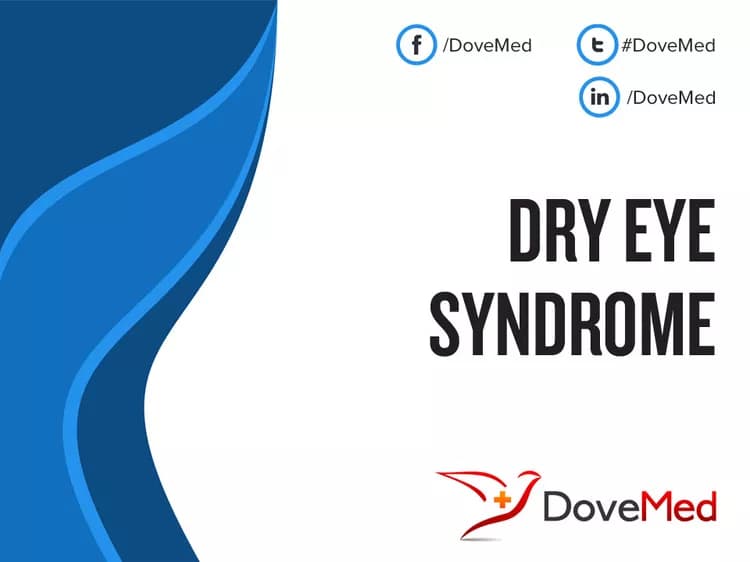What are the other Names for this Condition? (Also known as/Synonyms)
- DES (Dry Eye Syndrome)
- Keratoconjunctivitis Sicca (KCS)
- Xerophthalmia
What is Dry Eye Syndrome? (Definition/Background Information)
- Dry Eye Syndrome (DES) is a benign condition wherein the eyes have insufficient amount of tears, which is necessary for normal eye function. It is usually a chronic disorder affecting older individuals
- There are 2 types of Dry Eye Syndrome, namely:
- Aqueous Deficient Dry Eye: In this condition, there is decreased amount of tear formation. Most commonly this occurs due to chronic inflammation of the eyes. It is more common than the Evaporative Dry Eye type
- Evaporative Dry Eye: In this condition, the tears evaporate rapidly by causing the eyes to dry-up, but the quantity of tears are normal. Usually, there is a lipid layer in the tear film of the eye, which decreases the evaporation rate. In this subtype of DES, the lipid quantity is decreased resulting in a lack of adequate protection from evaporation
- The common signs and symptoms of Dry Eye Syndrome include blurred vision, itching sensation in the eye, and a feeling of foreign body presence in the eye. The complications can include damage to the cornea that can result in permanent vision loss
- The treatment of Dry Eye Syndrome includes providing adequate hydration to the eyes and treating the underlying cause appropriately
The International Dry Eye Workshop defines Dry Eye Syndrome as a “multifactorial disease of the tears and ocular surface that results in symptoms of discomfort, visual disturbance, and tear film instability with potential damage to the ocular surface.”
Who gets Dry Eye Syndrome? (Age and Sex Distribution)
- Dry Eye Syndrome is more common with aging; middle-aged and elderly adults most likely to be affected by this condition
- Females are more likely to be affected than males
- DES is observed worldwide and all racial and ethnic groups are at risk
What are the Risk Factors for Dry Eye Syndrome? (Predisposing Factors)
The risk factors for Dry Eye Syndrome include:
- Menopause: Postmenopausal women are at a higher risk
- Exposure to smoke, polluted air, or dust
- Living in a desert climate with low humidity
- Medications such as antihistamines, oral contraceptives, and isotretinoin
- Systemic disorders such as Sjögren’s syndrome, rheumatoid arthritis, and thyroid disease
- Failure to blink frequently, which can happen while working on computers for a long period of time
- Occupations that involve chronic sun exposure such as farming
- Smoking
- Contact lens wear for long time periods
- Frequent use of cold or allergy medications
- Injury to the tear glands
- A history of previous eye surgery (Iatrogenic Dry Eye Syndrome)
- Refractive surgery (LASIK)
- Developmental defects of the eyelids in which the eyelids do not close properly. In such individuals, dry eyes may result especially while sleeping
- Other environmental factors include the use of ceiling fans
It is important to note that having a risk factor does not mean that one will get the condition. A risk factor increases one's chances of getting a condition compared to an individual without the risk factors. Some risk factors are more important than others.
Also, not having a risk factor does not mean that an individual will not get the condition. It is always important to discuss the effect of risk factors with your healthcare provider.
What are the Causes of Dry Eye Syndrome? (Etiology)
The cause of Dry Eye Syndrome is either due to inadequate tear production causing dry eye or rapid tear evaporation causing dry eye.
- Inflammation of eyes and tear-producing lacrimal glands causes decreased tear production
- Lack of lipid layer on the tear film causes instability in maintaining a normal tear film necessary for normal eye functioning
- The meibomian glands of the eyes supply the lipids for the tear film. Any condition that leads to meibomian gland dysfunction can cause the tears to evaporate rapidly
What are the Signs and Symptoms of Dry Eye Syndrome?
The signs and symptoms of Dry Eye Syndrome may include:
- Burning sensation in the eyes
- Foreign body sensation in the eye
- Reflex tearing
- Redness of the eyes
- Intermittent blurry vision
How is Dry Eye Syndrome Diagnosed?
Dry Eye Syndrome is diagnosed using the following methods:
- Complete physical examination with thorough evaluation of the individual’s medical history
- A thorough eye examination by an ophthalmologist
- The eye specialist may perform a variety of tests to determine the cause of DES, which may include:
- Measurement of tear meniscus height
- Assessment of tear film quality as seen through a slit lamp
- Measurement of tear break-up time (how quickly the tears evaporate)
- Measurement of tear osmolarity (how salty the tears are)
- Assessment of corneal staining (corneal inflammation) as seen through a slit lamp
Many clinical conditions may have similar signs and symptoms. Your healthcare provider may perform additional tests to rule out other clinical conditions to arrive at a definitive diagnosis.
What are the possible Complications of Dry Eye Syndrome?
Complications due to Dry Eye Syndrome could include:
- Severe signs and symptoms in case of a lack of treatment
- Irreversible damage to the cornea resulting in permanent vision loss
How is Dry Eye Syndrome Treated?
The treatment measures for Dry Eye Syndrome may include the following measures:
- Artificial tears can be used in mild cases of dry eyes. The eye specialist may recommend over-the-counter artificial tear solutions depending upon each individual’s specific circumstances
- Lubricating gels and ointments can be used to decrease the rapid evaporation of tears
- Warm compresses with eyelid massages (expresses oils from meibomian glands)
- Fish oil consumption that contains omega 3 fatty acids may increase tear production
- Topical cyclosporine may be prescribed to increase natural tear production
- Medication to decrease eye inflammation
- Punctual plugs, such as silicone or gel-like plugs to block tear ducts, can be used before deciding on a more invasive surgical treatment option
- Surgical procedures to block tear ducts may be performed to decrease the drainage of tears from the eye. Such procedures are used in severe cases of dry eyes
How can Dry Eye Syndrome be Prevented?
Preventive methods for Dry Eye Syndrome could include the following steps:
- Blinking frequently will reduce the evaporation of the tear film on the eyes; also take frequent breaks while working on the computer
- Use of humidifiers, particularly in hot-dry or low humidity environments
- Do not wear contact lenses beyond recommended use
- Frequent artificial tear use can help in dry weather conditions
- During windy and bright sunny conditions, wearing sun glasses can conserve tears and prevent dry eyes
- Adequate consumption of omega 3 fatty acids through one’s diet
- Keeping good hydration in hot and humid or hot and dry conditions will not only prevent dehydration, but also help prevent dry eyes
- Regular follow-up visits with the healthcare provider to treat diseases and disorders that increase one’s risk for Dry Eye Syndrome is very essential
What is the Prognosis of Dry Eye Syndrome? (Outcomes/Resolutions)
- The prognosis of Dry Eye Syndrome depends upon the underlying conditions. Generally mild cases of dry eyes have better prognosis than severe cases
- The symptoms are usually controllable, if the dryness is mild and if it is due to environmental factors or medication use
- It is more difficult to treat and control symptoms, if the dryness is severe and if the condition is due to hormonal factors or systemic conditions such as Sjögren’s syndrome
Additional and Relevant Useful Information for Dry Eye Syndrome:
- Eye doctors may treat Dry Eye Syndrome differently depending on its type and severity
- An eye exam is always recommended to properly diagnose DES and to seek the most appropriate treatment option(s)
Related Articles
Test Your Knowledge
Asked by users
Related Centers
Related Specialties
Related Physicians
Related Procedures
Related Resources
Join DoveHubs
and connect with fellow professionals



0 Comments
Please log in to post a comment.